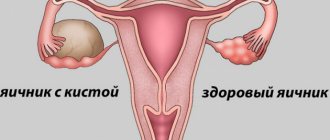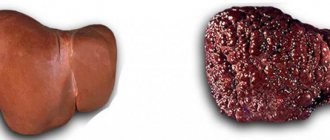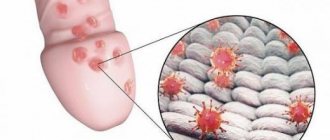Allergies during pregnancy: when is treatment needed?
Of course, manifestations of allergic conjunctivitis or a slight rash on the skin will not harm the fetus; you can do without the use of medications. It’s another matter if it is severe hay fever with the inability to free nasal breathing, bronchospasm or anaphylactic reactions with swelling of the face and neck, threat of asphyxia or shock. In these situations, help must be immediate. Often in such situations, antihistamines are used, which may become unsafe for the fetus in one trimester or throughout the entire pregnancy. What to do in such a situation? First of all, it is important to remember that pregnancy is a time when all therapeutic measures are carried out only under the supervision of a doctor, and all medications are taken only with his approval. If this is an acute situation, it is important to call an ambulance. Emergency room specialists will proceed from the method of treatment and those medications that will be most effective for the pregnant woman and minimally dangerous to the fetus.
How the disease develops
So, what is the mechanism of allergic reactions? There are three stages in the development of the disease.
First stage. The allergen enters the body for the first time. This quality can be plant pollen, animal hair, food products, cosmetics, etc. Cells of the immune system recognize foreign substances and trigger the formation of antibodies.
Second stage. An allergen that enters the body again binds antibodies on the surface of the mast cell. This triggers the opening mechanism of mast cells: biologically active substances (histamine, serotonin, etc.) are released from them, which cause the main symptoms of allergies; they are also called inflammatory mediators or pro-inflammatory hormones.
Third stage. Biologically active substances cause vasodilation and increase tissue permeability. Swelling and inflammation occurs. In severe cases, when the allergen enters the bloodstream, severe vasodilation and a sharp drop in blood pressure (anaphylactic shock) are possible.
| Light OAZ | |
| OAZ | Clinical manifestations |
| Allergic rhinitis | Difficulty in nasal breathing or nasal congestion, swelling of the nasal mucosa, discharge of copious watery mucous secretions, sneezing, burning sensation in the throat. |
| Allergic | Hyperemia (redness), swelling, injection of the conjunctiva (vessels are visible on the white of the eye), itching, lacrimation, photophobia, swelling of the eyelids, narrowing of the palpebral fissure. |
| Localized urticaria | A sudden lesion of a part of the skin: the formation of sharply defined rounded blisters with raised edges and a pale center, accompanied by severe itching. |
| Heavy OAZ | |
| OAZ | Clinical manifestations |
| Generalized urticaria | A sudden lesion of the entire skin with the formation of sharply defined round blisters with raised erythematous (red) edges and a pale center, accompanied by severe itching. |
| Quincke's edema | Swelling of the skin, subcutaneous tissue or mucous membranes. It most often develops in the area of the lips, cheeks, eyelids, forehead, scalp, scrotum, hands, and feet. At the same time, swelling of the joints, mucous membranes, including the larynx and gastrointestinal tract may occur. Edema of the larynx is manifested by cough, hoarseness, and suffocation. Swelling of the gastrointestinal mucosa is accompanied by abdominal pain, nausea, and vomiting. |
| Anaphylactic shock | Arterial hypotension (low blood pressure) and stupor in mild cases, loss of consciousness in severe cases, respiratory failure due to laryngeal edema, abdominal pain, urticaria, itchy skin. Manifestations develop within an hour after contact with the allergen (usually within the first 5 minutes). |
The most common manifestations of allergies in pregnant women are allergic rhinitis, urticaria and angioedema.
Antihistamine tablets for allergies
Today, the group of antihistamines includes a large number of drugs belonging to different generations. In total, three main generations have been identified, differing in the strength and duration of exposure, the presence and severity of side and negative effects. But to prescribe them during pregnancy, this data alone is not enough to choose the right allergy pills. It is also important to take into account their ability to penetrate the placenta to the fetus and cause various effects in it (ranging from embryotoxic to sedative).
All drugs in the form of solutions or tablets for allergies are prescribed only according to strict indications, the minimum permissible dosage and a short course, so that the potential negative effects on the child are ultimately minimal.
Allergy treatment: choice of medications
Allergies are treated with all generations of drugs, but the conditions and situations under which one or another group can be approved for use are different. First generation medications have a quick and fairly powerful effect on allergy symptoms caused by the release of histamine. However, they are characterized by low selectivity of action and a special anticholinergic syndrome, as well as a strong sedative effect. This group includes medications such as Suprastin, Diphenhydramine, Tavegil, Pipolfen and others.
The second generation of drugs for the treatment of allergies has a number of advantages over previous drugs. They do not have an inhibitory effect on the nervous system, the selectivity of action is higher, but a cardiotoxic effect is noted, especially if long-term use is necessary. This group includes medications such as Fenistil, Astemizole, Claritin.
Third generation drugs are most preferred in the treatment of allergies. This is due to a significantly reduced number of side effects and negative reactions, good tolerability and high efficiency from the first days of taking them. The most famous of them are Cetrin, Telfast or Erius.
Which medications can be used during pregnancy?
Treatment of allergies and the choice of specific medications depend on how strong and quickly the reaction develops and whether it threatens the life and health of the pregnant woman. Based on this, the dose, route of administration and duration of allergy treatment are selected. Not only the effectiveness of the drugs is taken into account, but their safety both with a single parenteral administration and long-term use, especially if these are allergy pills.
If an allergy develops in the first trimester, the situation is especially difficult, because most drugs are not recommended for use during this period. Therefore, it is worthwhile to make do as much as possible with non-medicinal means or using safe drugs (local, barrier sprays, sorbents, hypoallergenic diet). But if not only the pregnancy is at risk, but also the life of the mother due to the risk of serious complications, the doctor decides to use some first-generation drugs.
During the second or third trimester, on the recommendation of an allergist, allergy pills can be used, taking into account that the benefits of treatment will significantly outweigh the possible risks posed by the medications. The safest of them will be Claritin, Cetrin, Telfast. If these are acute reactions that require immediate relief, Suprastin is used in a hospital setting under the supervision of a specialist.
Medicines for the treatment of allergic reactions in pregnant women
First of all, every expectant mother should know what an allergic reaction is in order to recognize it in time and take the necessary adequate measures.
So, an allergy is usually called an atypical immune response, that is, an atypical reaction of the immune system of any person, to any substances that have always been considered familiar and harmless, but now cause a painful reaction in the body.
For a pregnant woman, it is very important to remember that allergic reactions can occur in completely different organs and systems of the body.
A very common and most common allergic reaction is a respiratory allergic reaction, when the organs of the respiratory system are affected and suffer, especially the lungs and nasal cavity (a cough and runny nose of varying intensity appears, the so-called allergic rhinitis).
You can often encounter a so-called allergic skin reaction, when the skin suffers - fullness, redness, peeling of the skin, itching and other symptoms appear.
Another common type of allergy is ophthalmic allergy, which is triggered by contact of any allergenic substance with the eyes.
Researchers and doctors believe that the increase in allergic diseases, including among expectant mothers, which has been observed in recent decades, is caused by a general deterioration of the environment, the intensive development of all types of industrial production and environmental pollution, increased incidence of acute stress and chronic stressful conditions, and increased lack of control. the use of medications, the almost universal use of chemicals for cleaning and disinfection, the increase in the number of synthetic products, and the abuse of cosmetics.
If any allergy symptoms appear, even if they seem minor, a pregnant woman should immediately notify her doctor and/or consult an allergist. Such treatment cannot be delayed, since it is unknown what toxic reactions can negatively affect the fetus and its development.
However, in some cases, cortisol turns out to be powerless - either too much of the allergen substance enters the body, or this allergen is still unfamiliar to the body, so the answer is not found. In addition, it is important to understand that normalization of cortisol in the postpartum period is inevitable, which will cause the resumption of all allergic manifestations.
In a word, pregnant women also from time to time have to resort to the help of antihistamines that can fight allergies.
Only some antihistamines are allowed for use during pregnancy, with many reservations and only with the permission of a doctor, if in this case there is no other option that does not involve the use of drugs.
Today, several generations of antihistamine (antiallergic) drugs are known, and all of them should be used with extreme caution or even not used at all, and this does not depend on the generation of the drug. Most often, the differences between generations of antihistamines are in the reduction and weakening of side effects, in increasing the duration of the effective effect on the body of one dose of the drug, in reducing the possibility of getting used to taking it and becoming drug dependent.
As you know, many foods can cause an allergic reaction. A hypoallergenic diet for pregnant women suggests eliminating any foods that could become a source of an allergic reaction while pregnant.
So, it is known that the following products can be the source of an allergic reaction: eggs (especially chicken), milk (especially fresh) and cheese, honey and bee products, all seafood, including crabs, shrimp, crayfish, oysters, fish and caviar, including including black and red, soybeans in any form, strawberries and raspberries, citrus fruits, tomatoes, chocolate, any canned foods, ready-made packaged juices, spicy, salty, fatty and fried foods, smoked foods.
Any porridge from any cereal, lean meats, poultry (meat dishes are best cooked boiled), fresh vegetables and fruits with a dull color, as well as dishes made from them (including potatoes, any cabbage, zucchini, cucumbers, etc.) are safe for expectant mothers. yellow and green apples, pears).
In addition to following a diet, it is necessary to observe other precautions that will allow you to resist allergic manifestations:
- It is very important that a pregnant woman avoids in every possible way not only active, but also passive smoking, since aggressive substances can cause irreparable harm to the developing fetus.
- The room where the expectant mother is located must be constantly ventilated.
- Wet cleaning is necessary daily.
- Upholstered furniture and carpets should be vacuumed at least once a week.
Pregnant women often experience allergies.
There are several reasons for this. These include hormonal changes in the body, and the reaction to the tissues and waste products of the fetus, and the seasonal factor is also added.
Fearing harmful effects on the fetus, women try to avoid taking extra pills. But at the same time they experience discomfort from allergies: difficulty breathing or itching interfere with proper rest and relaxation. What pills can you take during pregnancy?
A huge number of people face allergies. Men and women of any age are affected; children are highly susceptible to allergic reactions. Therefore, research in this area and the development of new drugs is very active.
Allergy medications, which require multiple doses and cause drowsiness, are being replaced by new generation formulas with a prolonged action and a minimum of side effects.
Do not forget that not only antihistamines, but also some vitamins can help in the fight against allergy symptoms. And pregnant women usually have a more trusting attitude towards them.
- vitamin C can effectively prevent anaphylactic reactions and reduce the incidence of respiratory allergies;
- vitamin B12 is recognized as a powerful natural antihistamine, helps in the treatment of dermatoses and asthma;
- pantothenic acid (vit. B5) will help in the fight against seasonal allergic rhinitis and reactions to household dust;
- Nicotinamide (Vit. PP) relieves attacks of spring allergies to pollen.
We suggest you read: Low blood pressure during early pregnancy: what to do
Newly emerging drugs are effective and do not cause drowsiness. However, many doctors try to prescribe more traditional remedies to pregnant women.
For medications that have been on the market for 15-20 or more years, enough statistical data has been collected to talk about their safety or negative impact on the health of the fetus.
Suprastin
The drug has been known for a long time, is effective for various manifestations of allergies, is approved for both adults and children, and therefore is also approved for use during pregnancy.
In the first trimester, when the fetal organs are forming, this and other drugs should be taken with extreme caution, only if absolutely necessary. During the rest of the period, suprastin is allowed.
Advantages of the drug:
- low price;
- performance;
- effectiveness for various types of allergies.
Flaws:
- causes drowsiness (for this reason it is prescribed with caution in the last weeks before childbirth);
- causes dry mouth (sometimes dryness of the mucous membranes of the eyes).
Diazolin
This drug does not have the same speed of action as suprastin, but it effectively relieves the manifestation of chronic allergic reactions.
It does not cause drowsiness, so there are restrictions on use only in the first 2 months of pregnancy; during the rest of the period the medicine is allowed for use.
- affordable price;
- wide spectrum of action.
Flaws:
- short-term effect (requires taking 3 times a day).
Cetirizine
Refers to new generation drugs. It can be produced under different names: Cetirizine, Zodak, Allertek, Zyrtec, etc. According to the instructions, cetirizine is prohibited for use during pregnancy and lactation.











